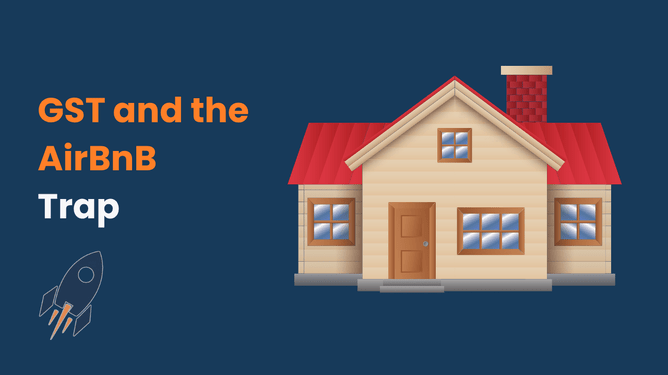It’s not uncommon for family trusts to own a mix of commercial and residential properties. As property use changes over time, especially with the rise of short-term rentals like AirBnB, GST obligations can become unexpectedly complicated and expensive.
Here’s a situation we recently helped a client work through (changed for anonymous reasons), including what to be aware of to prevent complicated situations.
Related reading: Should you AirBnB your holiday home? If you’re thinking of AirBnBing your bach? Before you hit “list,” uncover the hidden tax, time and cost traps.
The situation
The Oakridge Trust* owns a commercial property that is leased to an industrial tenant. It is GST registered because commercial rent is a taxable supply and it receives rental income of more than $60k pa.
The Trust also owns another property that is occasionally used for short-term AirBnB stays. These stays generate modest income, and there was an incorrect assumption that as long as the income stayed under the $60,000 threshold, GST would not apply.
Unfortunately, that assumption was incorrect.
The problem
Once an entity (including a trust) is registered for GST, all taxable supplies must include GST regardless of how much income they generate.
In this case, the Trust’s GST registration, triggered by the commercial rental activity, also pulls the AirBnB income from the other property into the GST net. Even if the short-term rental income is only $20,000 per year, the Trust is required to return GST on that income and also on the eventual sale or change in use of the property.
It gets more complicated.
GST can only be claimed on the portion of the property used for AirBnB. Later on, GST must be repaid based on the market value of that same portion when it is sold or its use changes.
GST does not stop at the nightly income. It attaches to the asset itself. You can claim GST when the property first enters the AirBnB pool, but you must repay it on sale or when use changes.
On a $600k property, the GST claim would be $90k, and say that the property increased in value to $1.5m, there would be $225k repaid on sale. Therefore, $135k paid in GST to IRD that would otherwise be tax free. Note – this assumes 100% of the property is available for the short-term AirBnB activity (if only 30% of the property was used, then adjust these numbers to 30%).
The options
We ran the numbers and outlined three options:
Continue as is
The portion of the property used for AirBnB enters the GST net. GST can be claimed on a portion of the original cost, must be returned on AirBnB income, and will need to be repaid later based on the market value on sale or change of use.
Sell the property to a new entity
This would trigger GST on the sale now, based on the portion used for AirBnB. However, if the new entity stays under the $60,000 threshold, any future gains would fall outside the GST net. This option creates a cleaner structure going forward but comes with an upfront GST bill and legal and banking considerations.
Stop using the property for AirBnB
Even this has tax consequences. Stopping AirBnB use is a change in use for GST purposes. The Trust is deemed to have sold the relevant portion of the property to itself at current market value and must return GST on that amount, even though it remains GST registered for the commercial rental.
The takeaway
Many property owners do not realise how GST registration for one property can create tax obligations for other assets. Short-term accommodation is especially risky and can quickly become uneconomic once GST and compliance costs are factored in.
Before launching an AirBnB or shifting property into a trust or company, it is worth checking:
Is your entity GST registered for any reason?
Are you returning GST on all taxable income?
What is your long-term plan for the property, and how will GST affect it on sale?
There are tools available, such as restructuring early (before purchasing the property or before conducting the activity).
Need help?
If you are unsure whether your current setup is still fit for purpose, or you are thinking of listing a property on AirBnB, we can help you model the tax impact and avoid any unpleasant surprises.
It is better to check before you list.
Contact Us
Contact us today to discuss on 07 827 9130 or email us. Our office is in Cambridge, NZ, but distance is no problem. We have many international and national clients.
This material has been prepared for informational purposes only, and is not intended to provide, and should not be relied on for, tax, legal or accounting advice. You should consult your own tax, legal and accounting advisors before engaging in any transaction.


